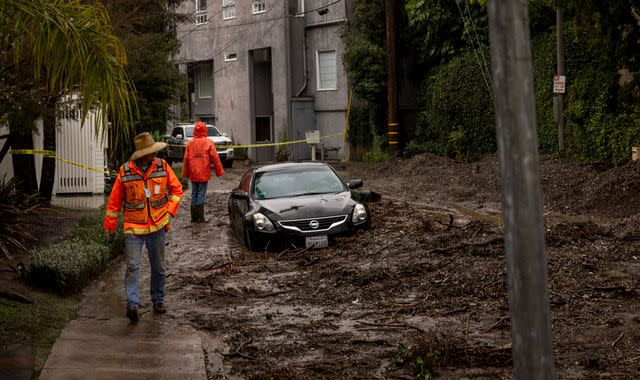California weather: Los Angeles hit by 475 mudslides as atmospheric river storm brings more rain

Los Angeles has recorded at least 475 mudslides after one of the wettest storms in the history of southern California.
Officials are warning of further mudslides and flooding after a large amount of the city's average annual rainfall fell in just three days - while seven deaths have been reported across the state.
LA mayor Karen Bass said: "Our hillsides are already saturated. So even not very heavy rains could still lead to additional mudslides.
"Even when the rain stops, the ground may continue to shift."
Three were killed yesterday in the extreme conditions - and nearly 400 trees have fallen in the city.
Another died today in a swollen Tijuana River channel near the border with Mexico.
LA fire chief Kristin Crowley said at least three dozen buildings required inspection because of mudslide damage and hillside slope failures - and seven had been marked unsafe.
In Los Angeles, between six and 12 inches of rain fell, making it the third wettest two-day stretch since records began in the 1870s.
One city resident, Dion Peronneau, said her home was hit by a mudslide which knocked her sliding glass doors off their frame as it came pouring into her home of 25 years.
She added: "Eight feet of mud is pressed up against my window that is no longer there.
"They put up boards to make sure no more mud can come in."
Read more from Sky News:
Former Fox News host Tucker Carlson set to interview Putin
Actress sues Disney over Mandalorian firing - in lawsuit backed by Elon Musk
Another heavy burst of rain is expected on Wednesday evening before the region begins to dry out, according to the National Weather Service.
The intense rainfall, with heavy snows in the mountains, was carried to California at the weekend by a storm system which meteorologists call an atmospheric river - a vast airborne current of dense moisture driven inland through a narrow corridor from the Pacific.
Experts warn such weather systems are likely to become more frequent and extreme if global warming from human-induced climate change continues at current rates.
The rain helped to boost some water supplies, just two years after most of California was plagued by a devastating drought.
Marty Adams, general manager of the Los Angeles Department of Water and Power, said more than one billion gallons of rain had been captured for groundwater and local supplies.

 Yahoo News
Yahoo News 
